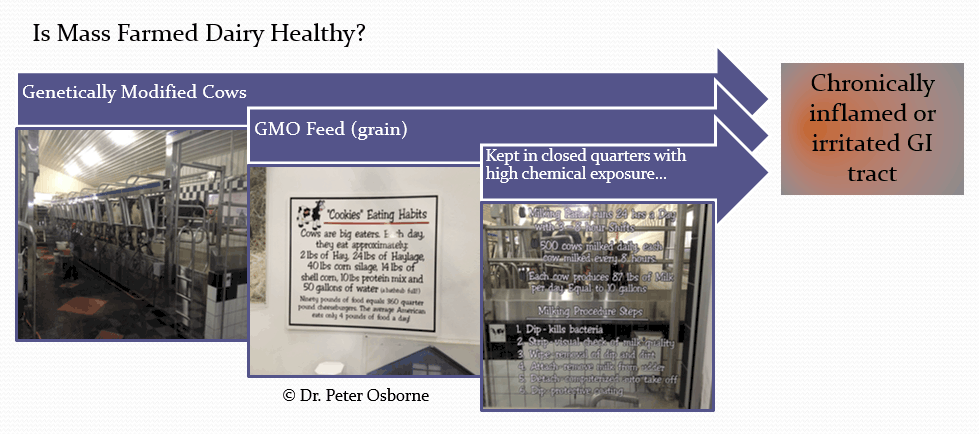If Your Gluten Free Can You Eat Cheese
Gastrointestinal Disease, Gluten Free Society Blog
Is Dairy Sabotaging Your Gluten Free Healing?
Research Identifies Dairy as a Problem For Those With Gluten Sensitivity
Many people embarking on a gluten free diet continue to consume milk, butter, cheese, and other dairy products without giving thought to the potential for having an inflammatory reaction. However; researchers have identified that dairy proteins can affect as much as 50% of those with gluten problems. This is one of the reasons I recommend both a gluten and dairy free diet for those diagnosed with gluten sensitivity. A summary of the research findings is listed below:
Patients with coeliac disease (CD) on a gluten-free diet may still have gastrointestinal symptoms. On clinical grounds cow's milk (CM) protein sensitivity may be suspected…A mucosal inflammatory response similar to that elicited by gluten was produced by CM protein in about 50% of the patients with coeliac disease. Casein, in particular, seems to be involved in this reaction.
Source: Clin Exp Immunol. 2007 Mar;147(3):449-55.
Why You Should Consider a Gluten and Dairy Free Diet
In my clinical experience with patients, dairy is one of the biggest problems contributing to persistent symptoms of disease. The study above identifies the protein, casein, as the biggest culprit. 50% of the study participants had an inflammatory reaction when exposed to dairy.
There are many research findings and clinical observations as to why this can happen:
- Processing of dairy alters the casein protein creating a molecule that resembles gluten, thus creating an inflammatory response.
- Eating dairy processed with the enzyme, microbial transglutaminase (AKA meat glue), can increase inflammation and cause an immune reaction in people with gluten sensitivity.
- Cows are supposed to eat grass, hay, etc. They are not designed to process the huge quantities of corn and grain based foods that they are fed. Some would speculate that these grain based proteins might make their way into the milk, thus creating an inflammatory reaction.
- Leaky gut – gluten can cause intestinal permeability. When this happens, people often times become allergic to the staple foods in their diet. As milk is a major staple used by those on a gluten free diet, many develop an allergic response to dairy.
- Digestive enzyme deficiencies – those with gluten induced intestinal damage of long standing nature tend to lack the capacity to be able to break down the sugars and proteins in dairy (AKA – dairy intolerance). This type of problem can cause tremendous GI distress, gas, distention, bloating, and pain. The undigested dairy materials can putrefy (become rotten) while in the gut. This in turn can create secondary inflammatory reactions. This can also lead to disruption in the healthy bacterial counts of the gut. As these bacteria are largely responsible for regulating immune response and inflammation, disrupting their numbers is a common cause of GI disturbance.
There are a number of problems with mass produced modern dairy products.
- The food for the cows are GMO (primarily corn and other grains)
- Recombinant bovine growth hormone
- Cows kept in tight quarters, little exercise, and exposed to massive quantities of antibiotics and hormones
- Ultra pasteurization of the dairy denatures and destroys much of the protein and nutritional value.
- For a more comprehensive breakdown on the topic click here ->> Is Dairy Safe On a Gluten Free Diet

Should You Be on a Gluten and Dairy Free Diet?
I would encourage those with gluten sensitivity to be on a gluten and dairy free diet for at least 6 months when initially going gluten free. This will allow for the prevention of allergy development, but also allow for reduced digestive stress on the GI tract. Humans lose the ability to digest dairy as they age. If you want to use dairy with your gluten free diet, I would encourage you to follow these rules:
- Insist that your dairy is grass fed only.
- Comes from animals who are not drugged with antibiotics and other stimulating hormones
- Use dairy that has not been altered by the industrial enzyme, microbial transglutaminase
- Buy from a local farmer
- Buy dairy in the raw form. If you want to pasteurize it, you can do so on your own stove top.
Go and watch the Devil in the Milk interview with Dr. Ford here. For more research on dairy and gluten, click here <<<
Always looking out for you,
Dr. O – The Gluten Free Warrior
If Your Gluten Free Can You Eat Cheese
Source: https://www.glutenfreesociety.org/is-dairy-sabotaging-your-gluten-free-healing/